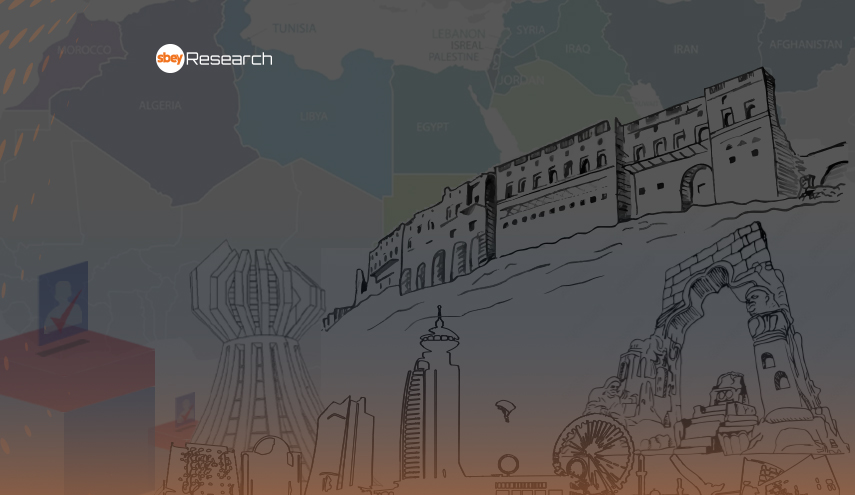

Introduction
In the heart of the Middle East, the Kurdistan Region of Iraq stands at a crossroads of transformation and tradition. The KCSI 2023 survey by Sbey Research provides an unmatched window into the opinions of its populace, acting as a barometer for the political climate and predicting the winds of change that might affect the upcoming electoral cycles. This essay explores the intricate web of governance, public satisfaction, and the complex interactions between the governed and those in authority, as seen in the survey. It underscores the potential shifts in voter behavior and the broader political implications that could redefine the region's future.
The Pulse of the People: Governance and Public Satisfaction
At the core of the KCSI 2023 findings is a populace that exhibits a cautious optimism mingled with palpable concerns over governance and public service delivery. The survey reflects moderate satisfaction with democratic processes and governance mechanisms, highlighting a desire among the citizenry for greater transparency, accountability, and efficacy in public administration. This sentiment, simmering within the electorate, signals a growing expectation for reforms that can bridge the gap between the government's promises and its deliverables.
The nuanced feedback on public services, from healthcare and education to infrastructure and environmental management, paints a picture of a society yearning for improvement. The varying degrees of satisfaction across these sectors spotlight areas of strength and, more importantly, delineate critical gaps that require immediate attention. The government's responsiveness to these sectors' demands could very well determine its standing in the eyes of the electorate.
Economic Tides: The Quest for Prosperity
Economic conditions emerge as a pivotal concern in the KCSI 2023 survey, with the Kurdish populace expressing a mixed sentiment towards employment opportunities, income stability, and overall economic security. The region's economic landscape, which is rife with difficulties but also brimming with potential, necessitates a strategic vision that can use its resources for sustainable development. Political entities that can articulate and implement such a vision will likely garner significant support from a voter base that places a high premium on economic revitalization.
The survey's insights into the economic aspirations and frustrations of the Kurdish people underscore a critical electoral battleground. The ability of political parties and candidates to connect with these economic sentiments, proposing viable solutions for job creation, economic diversification, and wealth distribution, could sway voter preferences and shape the electoral outcome.
Infrastructure and Quality of Life: Building the Foundations of Contentment
Satisfaction with infrastructure and quality of life remains a cornerstone of public contentment and political stability. The survey underscores a pressing need for investments in healthcare, education, transportation, and utilities—sectors that directly impact the daily lives and well-being of the populace. The electorate's evaluation of government performance in these areas will be instrumental in shaping their political allegiances.
Political actors equipped with pragmatic, innovative plans for infrastructural development and enhancement of life quality stand to make significant inroads with the electorate. The emphasis on building resilient, efficient, and inclusive public services could resonate deeply with voters, influencing their choices at the ballot box.
The Social Fabric: Unity in Diversity
The KCSI 2023 survey also touches upon the social dynamics within the Kurdistan region, highlighting issues of social cohesion, minority rights, and cultural inclusion. The political implications of these findings are profound, suggesting that electoral success hinges on candidates' and parties' ability to promote social harmony and inclusivity. The electorate's sentiments towards social issues reflect a broader desire for a political landscape that celebrates diversity, ensures equality, and fosters a sense of belonging among all segments of society.
Safety, Security, and the Echoes of Stability
Notably, the survey indicates high satisfaction with safety and security, a testament to the Kurdistan Regional Government's efforts in maintaining peace and order. This satisfaction is a crucial political asset, reinforcing the electorate's desire for continuity in effective security policies. Political candidates and parties that prioritize and pledge to maintain these levels of safety and security are likely to find favor with voters, underpinning the intrinsic link between personal security and political stability.
Navigating the Electoral Currents: Strategies for Success
The KCSI 2023 survey's findings offer valuable insights for navigating the electoral currents as the Kurdistan region steers toward its upcoming elections. The quest for enhanced governance, economic reform, infrastructural development, social cohesion, and sustained security forms the crux of the electorate's expectations. Political entities that adeptly address these areas, demonstrating a genuine commitment to public welfare and sustainable development, will likely emerge as frontrunners in the electoral race.
The survey suggests a political landscape in flux, with the potential for new narratives and alliances to shape the future of Kurdistan's democracy. It calls for a political strategy that is responsive, inclusive, and forward-looking, capable of translating public sentiments into actionable policies that resonate with the electorate's aspirations.
Conclusion: Toward a Future Forged in the Fires of Aspiration
The KCSI 2023 survey, with its nuanced exploration of citizen satisfaction across multiple dimensions, serves as a clarion call for political renewal and reform in the Kurdistan region. It lays bare the electorate's demands for a government that is transparent, accountable, and responsive to their needs. As Kurdistan stands on the precipice of pivotal electoral moments, the survey's findings underscore the imperative for political actors to heed the people's voice, crafting policies and platforms that address the articulated needs and concerns.
In navigating the currents of change, the political entities of the Kurdistan region are tasked with a monumental opportunity: to harness the insights of the KCSI 2023 survey in shaping a future that aligns with the aspirations of its people. The path forward demands courage, innovation, and an unwavering commitment to the public good—a journey that, if embarked upon with sincerity and strategic foresight, could usher in a new era of prosperity, stability, and democratic vibrancy for the Kurdistan region.



